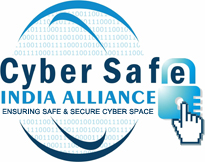Cyber Safety for Citizens
If you use the Internet, you're a citizen of a global community-a cyber citizen. Just like being a citizen of your local community, being a cyber citizen has responsibilities. Use the Internet to share knowledge that makes people's lives better. Keep safe, use good manners and respect the laws.
A computer virus is a program that can invade your computer and d mage or information. Anti-virus software is designed to protect you and yourcomputer against known viruses. But with new viruses emerging daily, anti-virus programs need to be updated regularly. Check with the web site of youranti-virus software company to see some sampledescriptions of viruses and to get regular updates foryour software. Stop viruses in their tracks!
Delete email from unknown sources. Watch out for files attached to e-mails, particularly those with an "exe" extension-even if people you know sent them to you. Some files transport and distribute viruses and other programs that can permanently destroy files and damage computers and Web sites. Do not forward email if you are not completely sure that any attached files are safe.
Do not write passwords down on small pieces of paper taped to your computer. You would be surprised how many people are sloppy about keeping their passwords private. Passwords that are easy to-guess are a bad choice. In other words, if your name is "Dan" do not make your password "Dan." Change your passwords regularly and don't give your passwords to anyone! Tell your family that combinations of letters, numbers and symbols are harder to crack than just words.
Install firewalls for your family-it is not difficult. Afirewall helps prevent hackers from breaking into your computer or the computers that belong to your family. Firewalls help prevent thieves from stealing and using private information including your phone number and credit card numbers, which may be stored on a family computer.
Your computer operating system may allow other computers on a network, including the Internet, to access the hard-drive of your computer in order to "share files". This ability to share files can be used to infect your computer with a virus or look at the files on your computer if you do not pay close attention. Check your operating system and other program help files to learn how to disable file sharing. Do not share access to your computer with strangers
The Internet is a two-way road. You get information and also send information. Turning off the Internet makes sure that someone else on the Internet can't enter your computer and cause harm. Disconnecting your computer from the Internet when you are not online lessens the chance that someone will be able to access your computer.
Help your family back up all household computers onto external media such as CD's or diskettes.
update "patches". Security flaws are regularly found in operating systems and application software. Companies that make software release quick fixes called "patches" that you should install to correct the latest software flaw. It is a good idea to check for security updates on the publisher's Web site for all the software you own.
security on a regular basis. Evaluate computer security at least twice a year. o help remember, do it when you change the clocks for daylight-savings time! Check for all of the items listed previously.
Private & Personal Information
- Some web sites request informationbefore allowing you to participate in anonline activity
- Stop and consider how providing suchinformation may affect your personal safety
- You can stay safe and have fun too
Private Identity Information
Stop and think, am I being asked to giveout information that revels who I amor where I can be found.
Smart E-mailing
- When opening your e-mail, always check to see who it is from first.
- Don’t reply to SPAM
- If contacted by a stranger, DON„T reply.
- Some E-mails may contain viruses. Never download a file unless you are expecting one
- If you receive a message that makes you feel uncomfortable, Print the message and show it to a parent or guardian.
- To spread computer viruses intentionally or to make changes to files that are not yours.
- To create, access, store, send, or print materials which are unlawful, obscene, pornographic, abusive, discriminatory, hate motivated,harassing or otherwise objectionable and will lead to severe penalties.
- To use free E-mail.
- To use chat rooms without permission.
- To download games, large files or pictures without permission.
Rules on cyber:-
It is illegal:
What's Private Identity Information
- Full (first and last) name
- Postal address
- Name of school
- School address
- E-mail address
- number
- Passwords
- Calling card number
- Credit card number
- Social security number
- Mothers maiden name
- Parent's place of work
- Photo's in which you can Recognized
